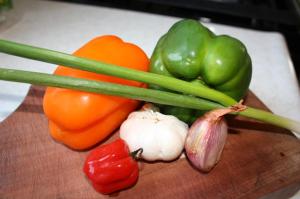Tantalize your taste buds with Gastronomy in Trinidad
Often, Caribbean tourism destination has been branded for mass tourism that is the sun, sea, sand factors. While the Caribbean still boasts of these abundant features they are not the only destinations with these product offerings. One can look to the exotic Maldives and by extension the Mediterranean for such sun lust. More over it is cost efficient for European travelers and even worthwhile to experience a vacation there. A new tourist is emerging who has experience, affluence and looks to a new experience. Now the Caribbean must act on its instinct and open their own Pandora’s box to save tourism. Each island is unique so the discovery of niche tourism is just a breath away from salvation for these isles. Trinidad, the energy capital of the Caribbean has hidden secrets. In this tropical paradise there must be diversification of their product to rejuvenate a fading tourism industry. Trinidad can explore gastronomic tourism, its pros and cons with reference to similar success stories and possible suggestions for implementation.
Gastronomic tourism refers to travel to destinations where food and drink drive tourists to travel. This offers an exhaling experience that purports difference associated with the destination. Gastronomic tourism is practiced in other countries as it is a necessary element for any tourism destination. Usually, it follows tourism products, festivals, sites and attractions and tours. Generally, gastronomic tourists are professionals between 30 and 40- years who earn more than average income. In Spain, the wineries support local development not to mention the production of garlic and olive oil. Croissants and champagne are synonymous with France. Regionally, jerk chicken and Jamaican patties are “Yardi” fancies. Nonetheless, Trinidad has its own cuisine because of its multicultural ancestry. Hence, bake and shark, pepper sauce, sour sop ice cream, chocolate, tamarind ball, toolum, doubles, pelau, corn soup, curry crab and dumpling are mouth watering desires that entice the palette. Thirsts can be quenched with mango, citrus, passion fruit wines and natural fruit punches. Angostura Limited has reintroduced rum and whiskey which suit the acquired taste buds of the avid food fan. Essentially, Gastronomic tourism does applaud a possible diversification to Trinidad’s tourism industry.
Basically, there are many advantages for promoting gastronomic tourism in Trinidad. Financially, food tourism can generate revenue. According to The International Culinary Tourism Association, the average tourists spend about one third of their budget on food related activities. On the other hand, deliberate food travelers spend a higher amount on food. There is increased food production to supplement the demand. Then, employment becomes the by product for the community. Entrepreneurial activity can be fostered as locals tap into their culinary skills.Greening of the environment can be seized with sustainable practices. Also, these activities usually take place in rural areas so the community benefits too. They attain pride, ownership by decision making and participation by the locals involved in these ventures. A success story is Jamaica who diversified their tourism from mass tourism. Again this activity occurs in rural areas and locals largely participate. Jamaica promote tours to their Appleton Rum Estate and learn the history, rum making, tasting and visit the distillery. Bicycle tours to Blue Mountain are anticipated where one can taste the Blue Mountain coffee. Devon’s ice cream House has a variety of natural flavours to reflect their culture. Similarly, Trinidad has packaged cocoa at Asa Wright Nature Centre for tourist but this is certainly inadequate for a land that is fertile. There are heritage and cultural linkages. Gastronomic tourism stimulates domestic tourism. In Debe Trinidad there is an area for vendors who sell popular Indo Trini delicacies to the public. Simply, diversification can breathe more life into Trinidad’s tourism.
Undoubtedly, there are issues that construe the success of any development even food tourism. A destination’s failure to sustain adequate resources to meet demand can plunge the niche market into despair. This emerging market is already creating competition. The main competing destinations are Europe; Spain, France and Italy. In addition, Asia has competition among, Japan, India and Thailand. A negligence to maintain competitive edge can be the deciding factor between profit and loss. Hence, Bio security risks can deteriorate this industry. Capital and accessibility to resources must be readily available to enter this business. Seasonality of products threaten income in the industry. Prevalent to any activity are disadvantages like loss of time and availability. Stake holder cooperation can deter futuristic development of the niche where conflict arises. Realistically, there are disadvantages in the diversification of Trinidad’s tourism industry.
Significantly, gastronomic tourism diversifies and supplements the tourism industry. It gives destinations the competitive advantage over others. It must be cultivated in a sustainable way with informed best practices to make a mark in this industry. While there are negatives to any development they must be considered for fruitful bearing on the discourse of food tourism in Trinidad. Some of Trinidad’s best kept secrets hide in the food industry. The cocoa has been rated as the best on the market and are exported for use. The bake and shark was deemed one of the top ten things foodie Zimmerman ever tasted. Trinidad food was rated on Bizarre Foods rated as The Travel Channel. Overall, there is definitely potential for gastronomic tourism in Trinidad. Essentially, diversification of Trinidad’s tourism industry via gastronomic tourism is a niche market that can supplement and possibly redeem the faltering industry.







